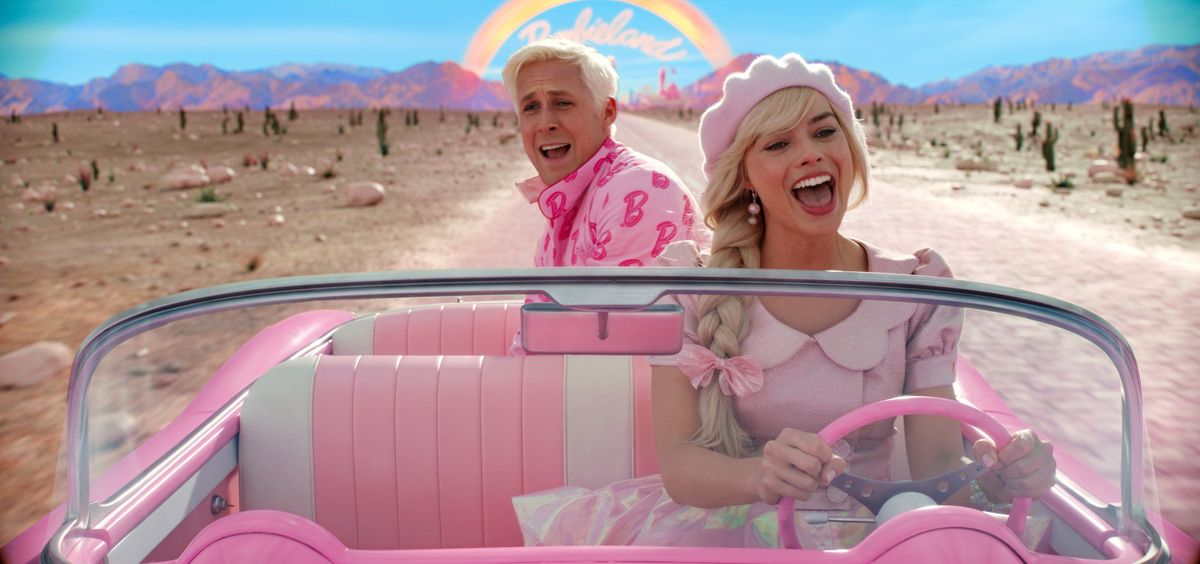Movie Review: With sublimely silly ‘Barbie,’ Gerwig takes aim at patriarchy

In Greta Gerwig’s hands, Barbie is a weapon. The director wields the iconic doll like a broadsword in “Barbie,” cleaving through culture with gleeful spirit and savage humor. In this existential exegesis on what it means to be a woman, and a human, Gerwig reflects our world back to us through the lens of Barbie, and in doing so, delivers a barbed statement wrapped in a visually sumptuous and sublimely silly cinematic confection.
Written by Gerwig and her husband, filmmaker Noah Baumbach, “Barbie” works in broad story strokes, which allows Gerwig to experiment with style and humor, creating the safe space for their pointed commentary on patriarchy, misogyny and perfectionism. These concepts don’t exist in the Barbieland, a girly utopia and true Barbiarchy, where only Barbies sit on the Supreme Court, win Nobel Prizes and get to be president. In this pleasantly plasticky and womb-pink dreamscape, anyone can be Barbie, Barbie can do anything, and he’s just Ken.
Barbie (Margot Robbie) has to leave the comfort of Barbieland in an attempt to stem the tide of irrepressible thoughts of death that start to creep through her cotton-candy consciousness, disastrously invading her disco dance parties. Our heroine is molded in the style of Neo of “The Matrix,” or Pee-Wee, from “Pee-Wee’s Big Adventure,” an innocent embarking on a journey outside of their cozy Baudrillardian simulacrum.
On the advice of Kate McKinnon’s Weird Barbie (scribbled-on makeup, crazy haircut, always in the splits), Barbie sets out to find the girl who’s playing with her, to close the portal between Barbieland and the Real World. Ken (Ryan Gosling) tags along. In Los Angeles, they both discover patriarchy, a concept that Ken brings back to Barbieland in a tidal wave of horse-themed artwork, leather couches and Sylvester Stallone-inspired mink coats, fomenting rebellion amongst the Kens.
While “Barbie” balances trenchant social observations and escapism, Gerwig draws on a century’s worth of movie references, and almost every Barbie doll and dwelling Mattel has ever made, including Midge (Emerald Fennell) and Alan (Michael Cera). The film borrows from the sherbet-colored artifice of “The Umbrellas of Cherbourg,” the opulent sets of “The Red Shoes,” the costuming of “Grease,” and Gene Kelly’s dream ballets of “An American in Paris” and “Singin’ in the Rain.”
Like the musical movie stars of yore, our stars tackle these roles with their whole bodies. Robbie delivers a physical performance that apes the stiff limbs and cheery grin of the doll, but also builds in awareness and emotion over the course of the film. She generously allows Gosling the bulk of the comic moments, as he leans into rubber-faced reaction shots and himbo charisma. It’s almost as if in his performance as Ken, we witness Gosling healing his inner child, the one who starred in the new Mickey Mouse Club, and whose cheesy tweenage dance performances go viral on social media every year.
But it’s Barbie’s awakening, a process of shock, sadness and acceptance, that is the spine of this story.
Throughout her roller-coaster ride to the Real World and back, Barbie discovers that feminism is about seeing the humanity in everyone, even Ken, but most importantly, in herself, despite the arduous challenges of the Real World.
One could make the argument that “Barbie” is a kind of culmination of pop cultural and cinematic history, but it’s the culmination of a pop cultural and cinematic history of a specific auteur. Gerwig has her own frame of reference, personal identity and artistic agenda, and this is her “Barbie,” a film that is expansive, fun and welcoming, but is a creation sprung from her own heart and mind.
There are jokes, nods and musical cues – elder millennial dog whistles – that make it clear that “Barbie” has been made by a white woman of a certain age, as Gerwig cracks open the casual, rampant misogyny that her generation weathered for the past 40 years. Barbie is her primitive tool to make fire; Barbie is the bomb that Gerwig drops on patriarchy. Only Barbie – the busty, ambitious doll that caught flack for “setting back feminism” – can be used to burn it all down, and it’s a miracle that Gerwig gets away with it too.